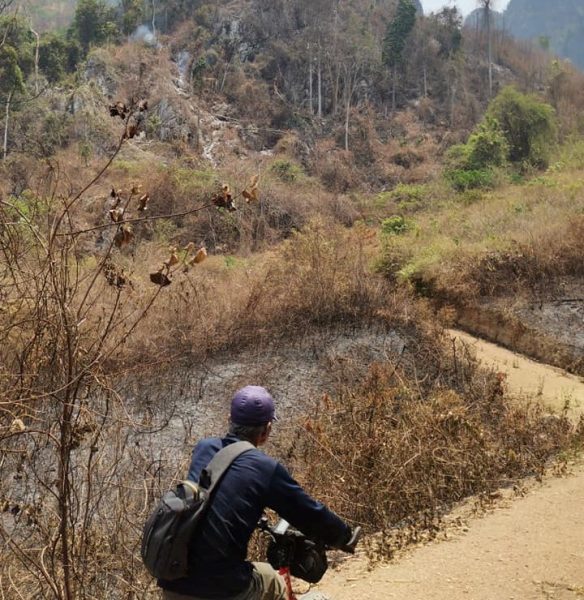LUANG PRABANG, 5 May 2023: Luang Prabang’s forest resorts are fighting an annual battle to keep bushfires at bay in the foothill of this popular UNESCO World Heritage town nestled next to the Mekong River.
But they admit it’s a losing battle as arsonists torch forests around the UNESCO World Heritage town to clear land for commercial plantations. They need a helping hand from regional and national travel associations to lobby for their members.

Since February, the Luang Prabang valley has been cloaked in smog, with air quality index figures creeping into the hazardous red zone for more than two months. It fuels an exodus of disappointed tourists, slashes bookings for accommodation and may have factored in Lao Airlines’ decision to suspend its direct Luang Prabang – Bangkok flights until the start of the cool season in early November.
Last week two resorts lost bungalows to bushfires blamed on arsonists bent on clearing forests to plant crops or to hunt what little wildlife is left in the forested hills around Luang Prabang.
The loss of six bungalows at two resorts, Lao Spirit Resort (one unit) and Zen Namkhan Resort (five) and close calls at other resorts in Luang Prabang should be a wake-up call for authorities, especially as owners of the near-nature resorts reassess the wisdom of their tourism investment in forest locations.
Lao Spirit Resort’s general manager Wieslaw Bylo keeps the ‘open’ sign posted on his website and online travel agency booking sites such as Booking.com and Agoda. He’s left with five bungalows. He runs the property on behalf of a group of German investors.
“It is not easy for me to lose my newest and best bungalow directly after the Covid-19 pandemic crisis,” he commented. “Every year, we find it more difficult to protect our resort from fire; the burning season was extremely long and intense this year.”
Bylo plans to rebuild the bungalow “ step by step while keeping the resort open.
According to its management, Zen Namkhan Resort lost five bungalows out of 10, an almost fatal blow for the business. The resort remained closed throughout the Covid-19 pandemic but was due to open in late April, just days before the bushfires engulfed the property. It’s left the management wondering if they have the energy to carry on and, more to the point, how to fund a rebuild.
Their sentiments are shared by other investors, including a German investor who leased 30 hectares in a forested valley close to Luang Prabang, where he developed a privately owned nature reserve highlighting a revered cave.
Arsonists encroached on the property burning the forest and grassland in repeated attacks that transformed a once beautiful natural valley attraction into a barren naked landscape that will take years to recuperate. Over 16 hectares of the property was torched.
After almost three years without guests due to the Covid lockdown, resorts in Luang Prabang face the fallout of a burning season out of control.
A reliable source linked to the two resorts and the nature reserve describes the double whammy of Covid and smog as devastating for the Luang Prabang Valley’s small and medium tourism enterprises. Many relied on partnerships with expatriate investors who partly funded resorts and tourism ventures. Covid-19 and this year’s burning season exhausted their resources. They urgently need a financial lifeline as they are without hope of securing micro or bridge loans to see them through the low season from May to October.
“There’s nowhere to go to seek assistance,” the source explained. “Attempting to secure microloans fails for ventures with foreign investors due to local laws.”
“Local banks demand interest rates of 13 to 14% on loans, and if foreigners are involved as shareholders, even that is impossible,” he explained. “We need microloans with interest rates of around 3 to 4%, not 14%. Who will invest in tourism in Luang Prabang under these conditions?”
SMEs in tourism have been cut adrift. There’s no voice lobbying for them or supporting them to rebuild business following the Covid-19 pandemic. They need tax incentives from governments and advice on how to obtain bridge loans to allow them to speed up recovery.
There are calls for tourism associations, both local and regional, to rethink their role and step up to the plate to adopt a clearer advocacy stance on behalf of their members to reach out to governments on behalf of their members.
Travel associations tend to adopt marketing objectives promoting events and presenting programmes that build awareness, but they often fall short when lobbying governments to level the playing for tourism stakeholders. They should stand in the SMEs’ corner and call on governments to end the smog season in the Mekong Region. But they should do much more.
Travel associations can broker deals on behalf of their SME members to obtain loans to see them through challenging times. In the case of the smog season and the threat bushfires pose for forest resorts, associations could broker insurance deals exclusively for their members and advise them on how to improve their fire prevention procedures. Practical hints and tips on installing fire fighting equipment on resort properties would give properties a fighting chance to ward off bushfires.
Instead, tourism enterprises are left to struggle through the annual smog season that blights business growth in the Mekong region without any meaningful assistance from regional and national travel trade associations.
When asked what the benefits regional and national associations bring to the table for most tourism SMEs, associations tell potential members they will benefit from marketing and promotion and enjoy attending events. SMEs in the Mekong Region deserve much more. They ask for a lifeline to recover from three years of Covid-19 lockdowns and environmental threats threatening their tourism recovery.






